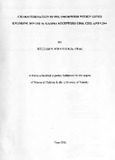| dc.description.abstract | Fc gamma receptors (FcYR) are a group of transmembrane molecules that specifically bind immunoglobulins of the IgG isotypes via the Fc portion and mediate several immunological functions. These molecules have been extensively studied in human and mouse at both the nucleotide and amino acid levels. Allelic polymorphism within the human FcYR, CD32, significantly alters the affinity of the receptor for its ligand with important immunological consequences. So far, the study of bovine FcY receptors has concentrated on the Bos taurus sub-species of cattle. Using East African B. indicus cattle representing the extremes of reaction to antibody neutralising subunit vaccination and challenge, the study aimed to design genomic DNA-based methods to determine if the genes encoding the FcYR CD 16, CD32 and CD64 are polymorphic. Initially, peripheral blood lymphocytes from two B. indicus cattle (FI00 and BR37) were selected for RNA extraction and subsequent cDNA synthesis. Polymerase chain reaction (PCR) primers were designed to amplify the extracellular encoding regions of the CD16, CD32 and CD64 genes. Fragments of 622 base pairs (bp), 601 bp and 778 bp were amplified, cloned and sequenced for CD 16, CD32 and CD64, respectively. Sequence analysis revealed limited nucleotide and amino acid polymorphism at the three loci when compared to the published B. taurus sequences. These include a change of proline to threonine and proline to leucine for CD 16, an insertion of an alanine for CD32 and a change of serine to proline for CD64. The extracellular distribution of these changes suggests a possible functional role associated with the observed polymorphism.
Design of DNA based methods to screen for polymorphism in large numbers of samples concentrated on CD32 and CD64. PCR primers were designed to amplify the exons encoding the extracellular regions of these molecules from 10 genomic DNA
samples. DNA samples were derived from cattle representing equal numbers of the extremes of reactions to challenge in cattle immunised with an E. coli recombinant form of p67, the major sporozoite surface protein of Theileria parva. The PCR products were analysed by single strand conformational polymorphism (SSCP). No differences were apparent among the 10 cattle analysed. However, positive controls differing at only two nucleotides could be successfully resolved using the SSCP technique, demonstrating that this method is a useful tool for analysis of allelic polymorphism within FcYR genes. Although only a limited sample, the failure to identify polymorphism within the exons encoding the extracellular regions of the 10 cattle CD32 and CD64 loci suggests that these genes have no influence on the outcome of the subunit vaccine trial. | |

